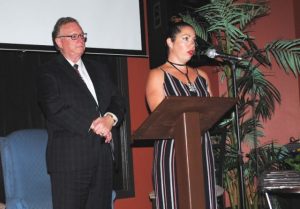July 18, 2018
By: Bill Conger
Matthew Wenger didn’t handle living alone well after he split up with the mother of his two children. He adjusted with “the daily party,” using and selling drugs.
“Eventually, it got to where it wasn’t fun anymore,” Wenger said. “As a matter of fact, it was pretty miserable. It got worse for about a year and a half to the point I was being watched by police, and things came crashing down.”
Wenger got in trouble with the law, facing at least a year in jail. He didn’t want to be behind bars or away from his kids so he decided to try DeKalb County Recovery Court’s drug and alcohol treatment program.
“Since I’ve been on it, they gave me all the tools I need to change everything, and it’s changed my life,” Wenger said.
He was one of seven people who graduated from the program Tuesday night. Plaques also were given to Jonathon Hummel, Billy Moss, Justin Redmore, and Spencer Wallace along with juveniles Jacob Wagner and Bryan Murphy for committing to be clean and sober. Family and friends attended the observance at the New Life Connection Center.
Redmore, who moved to Tennessee from Chicago, told WJLE he fell in with the wrong crowd and started using.
“When you lose enough and hit rock bottom, you find out real quick that wasn’t what you should have been doing,” says Redmore. “I got tired of living like that. I did what I had to do to get where I’m at. There ain’t no going back for me.”
Two of the graduates attended The Hope Society in Lebanon, a non-profit that helps people with transitional living as they strive to remain alcohol and drug free. The Director, Brandy Worman—guest speaker for the event—understands all too well where her residents are coming from.
“By the time I was 30 I had been arrested over 30 times,” Worman said. “I was a meth cook. I had lost my kids, and I found myself in jail for almost two years. It was people like the judge here that saved my life because jail saved me. If it wasn’t for jail, I wouldn’t be here right now. Had I paid for everything I did wrong, I would be in prison for the rest of my life. I say this because I love everyone that is going through the same struggles that I went through.”
“I want to help these people get their families and their lives back on track. You don’t realize how blessed you are to have these folks [DeKalb County Recovery Court] in your life. They love you sincerely. I’ve worked with the Nashville and some other drug courts, and these folks are genuine. They genuinely love and care about you. They want to know you, they want to know your families, they want to help you, [and] they want to support you in whatever your dreams are. I personally feel blessed to have these folks in my life.”
Recovery Court Program Coordinator Norene Puckett told the crowd that some people seem to think that choosing the path to recovery is an easy cop out to time in a cell.
“Our program’s way more than a get-out-of-jail free card,” Puckett said. “Most of the people in this room can’t stick to a diet for a week or whatever bad habits or good habits that you’re trying to achieve. We can’t even go longer than a week and make a new habit.”
“This program is life-saving,” Puckett adds. “This is what it’s like to have a treatable disease, in this case addiction. This is recovery, this is hard work, and it’s what it takes to change your life is hard work. Hard work, determination, humbleness, a connection to your higher power and gratitude are some of the key traits to long term recovery, and we feel our graduates tonight have those traits.”
General Sessions and Juvenile Court Judge Bratten Cook, II, who started the alternative to jail, says choosing to participating in the recovery court program is hard work.
“We tell people before they come into the program before we accept them that if they’re looking for the easy way out, then you just need to go to jail and serve your time because it’s going to be a whole lot easier than going through the program, do everything that you have to do and be a success. And there’s some that decide I’m not going to do it. They just lay in jail and serve their sentence. They get out. They learn nothing except maybe how to be a better criminal and get back in trouble again.”
Judge Cook says he can understand the stranglehold addiction can have on a person’s life. A former 4 packs a day smoker, Cook says nicotine was challenging enough to quit, so he can only imagine the struggle others face with substance abuse. He’s hopeful people will begin to see that addiction is more than a battle of will power.
“There’s still some ignorant people in the world that do not believe addiction is a disease,” Judge Cook told the audience. “It’s like, ‘Well, just quit! Just stop it! Quit taking that!’ Well, you can’t do that. Science has proven that it affects the brain. It’s a disease. You wouldn’t tell somebody that has a tumor, “Why don’t you reach in and cut it open, get it, throw it away, and get on back to work. Same thing.”
Besides the humanitarian help the recovery court provides, there’s also a financial benefit for the county.
“Incarceration costs our county at least $20,000 a year for each man,” Puckett says. “Since its inception, our program has saved at least $1.4 to $1.8 million dollars in incarceration costs for DeKalb County.”






